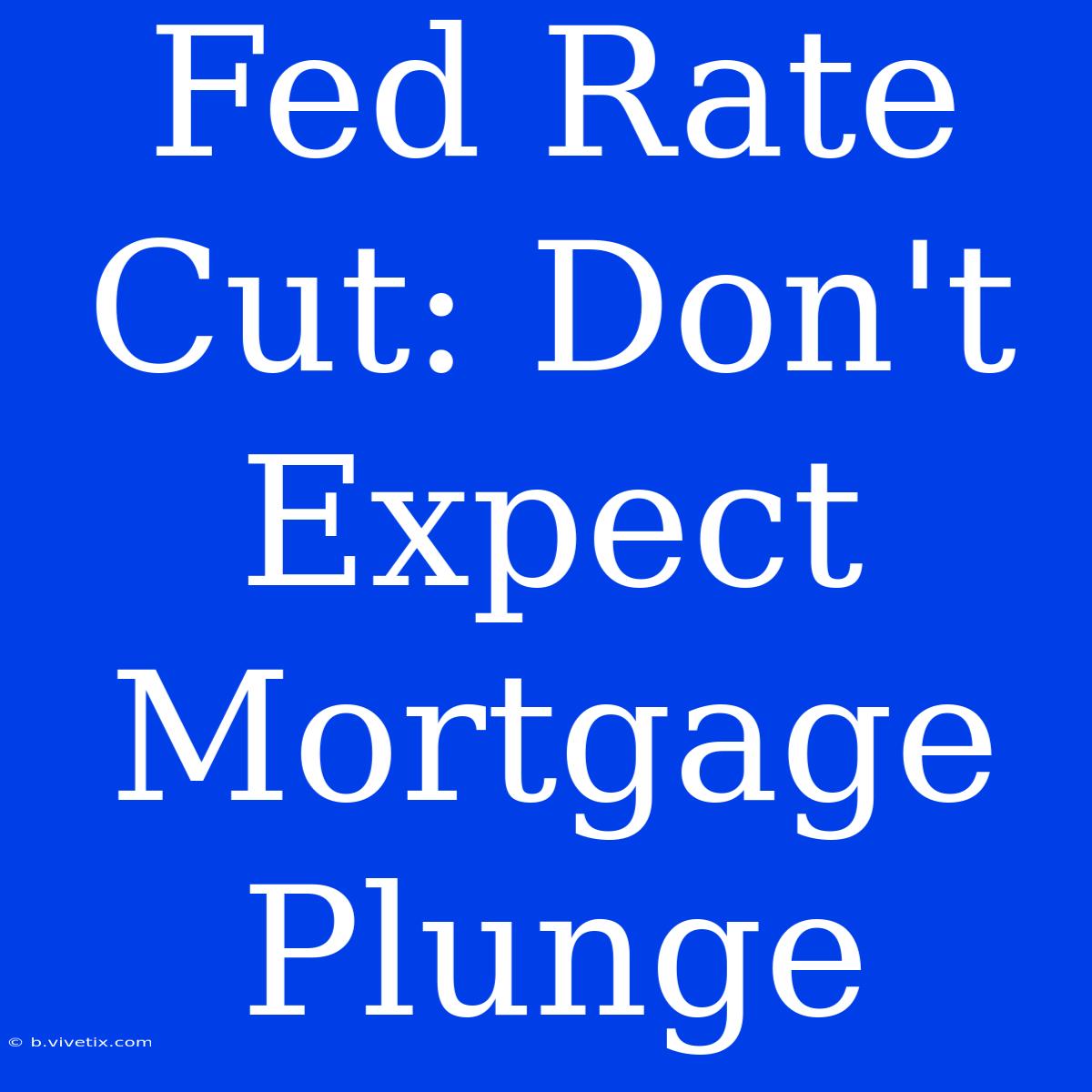Fed Rate Cut: Don't Expect a Mortgage Plunge
Is a Fed rate cut the key to unlocking lower mortgage rates? While a cut could offer some relief, don't expect a dramatic plunge in rates just yet.
Editor Note: The Federal Reserve's potential rate cut has ignited speculation about a significant decline in mortgage rates. However, a closer look reveals a more nuanced reality.
Understanding the relationship between the Fed's monetary policy and mortgage rates is crucial for navigating the housing market. A rate cut could signal a shift in the economic outlook, but it's not a guaranteed path to lower borrowing costs.
Our analysis delves into the intricate connections between Fed rate cuts, mortgage rates, and the broader economic landscape. We'll explore the key factors influencing mortgage rates and provide insights to help you make informed decisions.
Key Takeaways
| Factor | Impact on Mortgage Rates |
|---|---|
| Fed Rate Cuts | Potentially lower rates, but not a guarantee. |
| Inflation | Higher inflation usually translates to higher mortgage rates. |
| Economic Growth | Strong economic growth can lead to higher mortgage rates, while weak growth may lead to lower rates. |
| Investor Demand | High demand for mortgage-backed securities can lower rates, while low demand can increase them. |
What Drives Mortgage Rates?
While the Fed's actions have a direct impact on short-term interest rates, mortgage rates are influenced by a broader set of factors.
1. Inflation: Inflation erodes the value of money, which often leads to lenders demanding higher interest rates to offset the risk of losing purchasing power.
2. Economic Growth: Strong economic growth can stimulate demand for loans, pushing rates higher. Conversely, weak economic growth can lead to lower demand and potentially lower rates.
3. Investor Demand: Mortgage-backed securities (MBS) are bonds backed by mortgage loans. Investors' demand for these securities can affect mortgage rates. High demand can drive down rates, while low demand can increase them.
4. The Fed's Monetary Policy: The Fed's target interest rates and other monetary policy actions can influence the cost of borrowing and, consequently, mortgage rates.
Expecting a Mortgage Plunge: A Realistic View
While a Fed rate cut might lower mortgage rates, it is unlikely to cause a significant drop. The market is already anticipating a rate cut, and much of its impact may already be reflected in current rates.
Moreover, other factors like inflation and investor sentiment remain uncertain.
For a dramatic decrease in mortgage rates, other factors like inflation and investor confidence need to improve significantly.
What This Means for Homebuyers and Sellers
Homebuyers:
- Don't wait for a dramatic mortgage rate drop: While a rate cut might offer some relief, it's unlikely to trigger a significant decrease in rates.
- Shop around for the best rates: Be proactive in comparing rates from different lenders.
- Consider a fixed-rate mortgage: This can lock in a lower rate and protect you from future rate increases.
Home Sellers:
- Don't expect a surge in demand: A Fed rate cut may not lead to a major increase in buyer activity.
- Price your home realistically: The market is still influenced by factors like inflation and inventory levels.
- Be prepared for negotiations: Buyers may be more cautious and demanding in their negotiations.
FAQ: Fed Rate Cuts and Mortgage Rates
Q: Will a Fed rate cut automatically lead to lower mortgage rates?
A: While a rate cut can influence mortgage rates, other factors like inflation and investor sentiment play a significant role.
Q: How much could mortgage rates decrease with a Fed rate cut?
A: The extent of the decrease is difficult to predict. It depends on various factors and is likely to be more gradual than a dramatic plunge.
Q: Is it a good time to buy a house if a Fed rate cut is expected?
A: The decision to buy a house is a personal one. Consider your individual financial situation, mortgage rate trends, and the overall housing market conditions.
Q: What should I do if mortgage rates rise after a Fed rate cut?
A: Stay informed about rate changes, and consider exploring refinancing options if rates become more favorable in the future.
Tips for Navigating Mortgage Rates in a Volatile Market
- Consult with a mortgage lender: Get expert advice on how to navigate the current market conditions.
- Understand your financial situation: Assess your budget, income, and debt levels to determine how much you can afford to borrow.
- Consider a fixed-rate mortgage: This can provide stability and protect you from future rate increases.
- Shop around for the best rates: Compare offers from multiple lenders to find the most competitive rates.
- Stay informed about market trends: Monitor economic indicators, Fed announcements, and mortgage rate movements to stay informed.
Summary: Fed Rate Cuts and the Mortgage Market
A Fed rate cut is not a guaranteed path to lower mortgage rates. While it can offer some relief, other factors like inflation, economic growth, and investor sentiment play a significant role. Homebuyers and sellers need to navigate the current market carefully, understanding the nuances of mortgage rates and their drivers.
Editor Note: The impact of a Fed rate cut on mortgage rates is multifaceted and requires careful consideration. By staying informed and consulting with experts, you can make informed decisions in this dynamic market environment.

